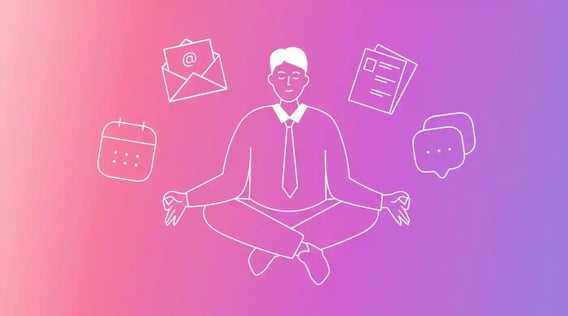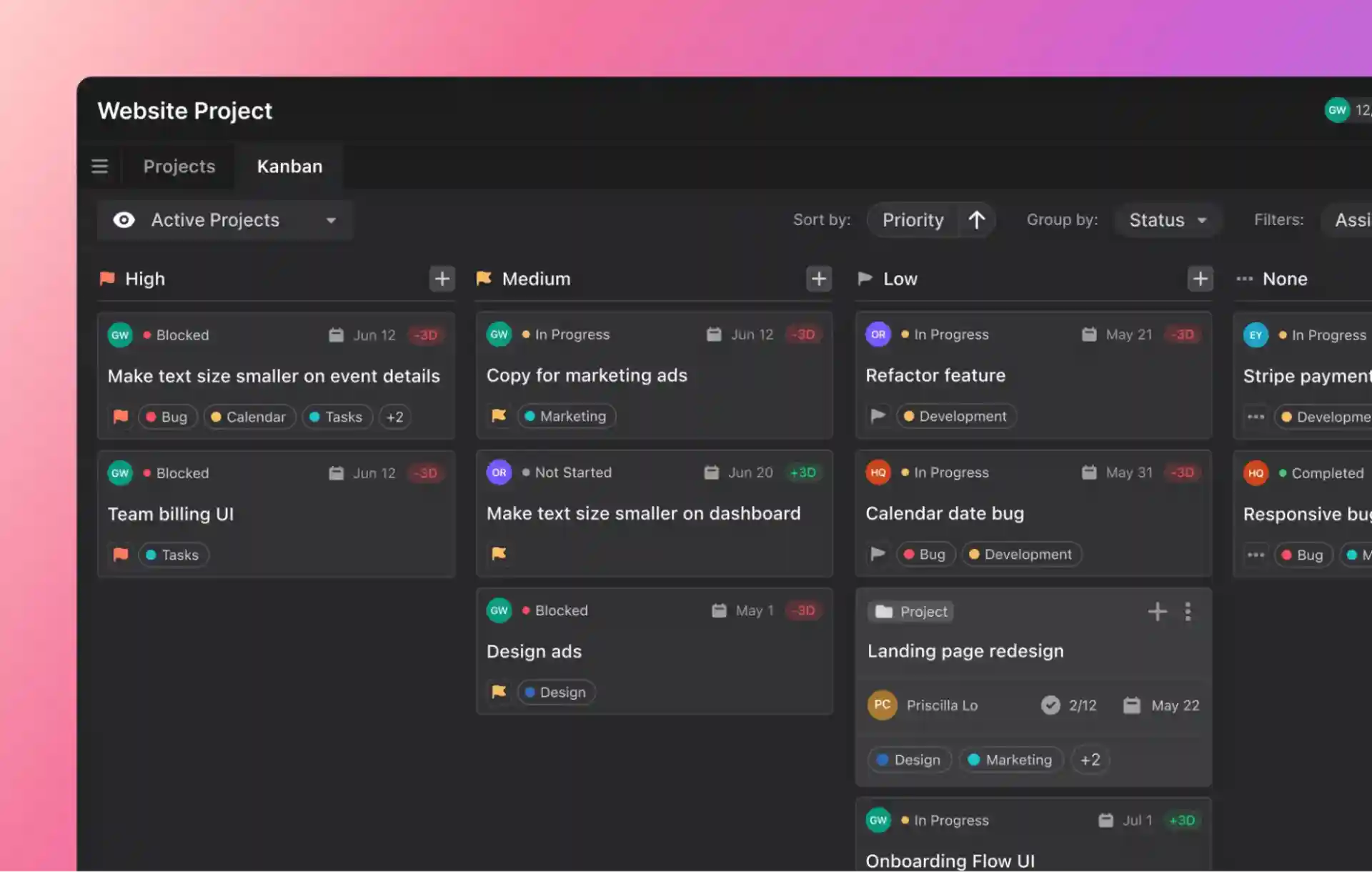Many of us search for ways to make our lives more meaningful so we can feel better.
The average Mental Health Quotient (MHQ) score globally is just 64 out of 300, signaling a need for profound transformation in our day-to-day lives if we want to shape a brighter future for ourselves.
There’s no shortage of self-help books, productivity hacks, and lifestyle routines to help us get more out of life. So, what’s the problem?
Maybe the answer lies in something simpler. Something more “Zen,” perhaps.
This article explores the transformative power of Zen habits, offering practical approaches to infusing your day-to-day routine with mindfulness and efficiency. Discover how Zen practices can make your life more balanced and productive.
What are Zen habits?
The concept of Zen, deeply rooted in the ancient teachings of Buddhist philosophy, is seen as not just a set of practices but a holistic way of living.
Originally aimed at achieving inner peace and enlightenment, Zen emphasizes:
- Mindfulness: Being fully present and aware in each moment
- Simplicity: Removing the unnecessary and prioritizing the essential
- Living in the present: Focusing on the current task or moment without distraction
- Inner peace: Cultivating a state of calmness and tranquility amid life’s chaos
Leo Babauta, a renowned simplicity blogger, has taken these principles and translated them into everyday habits that are accessible and relevant to our daily lives.
For example, Babauta shared his personal journey of changing habits, such as quitting smoking and becoming a runner, through the lens of Zen simplicity and mindfulness. His story demonstrates the practicality of incorporating Zen into everyday scenarios and how even ancient practices can guide us toward profound personal growth.
Benefits of integrating Zen habits into the workplace
When Zen principles are transformed into daily habits, they offer valuable solutions for the challenges of today’s fast-paced, digitally-driven workplace. Here are just a few of them:
Increased focus and clarity
Zen habits such as giving mindful attention to the task at hand or decluttering your physical space help combat distractions. Instead of juggling multiple tasks or responding to constant notifications, you take a singular focus. This leads to improved concentration and clarity in your work tasks. You’ll find yourself more engaged and able to tackle each challenge with more precision and insight.
Reduced stress
Regular Zen practices, like meditation and deep breathing, can significantly lower stress levels in the workplace. They help break the cycle of constant mental stimulation, a common source of stress at work. Shifting to a calmer state helps you not only better manage immediate stress but also develop resilience against future stressors.
Less stressed employees tend to have better focus, more creativity, and enhanced problem-solving abilities. They also enjoy better physical and mental health.
Mindfulness
Present moment awareness improves emotional intelligence and fosters a more mindful, responsive work environment.
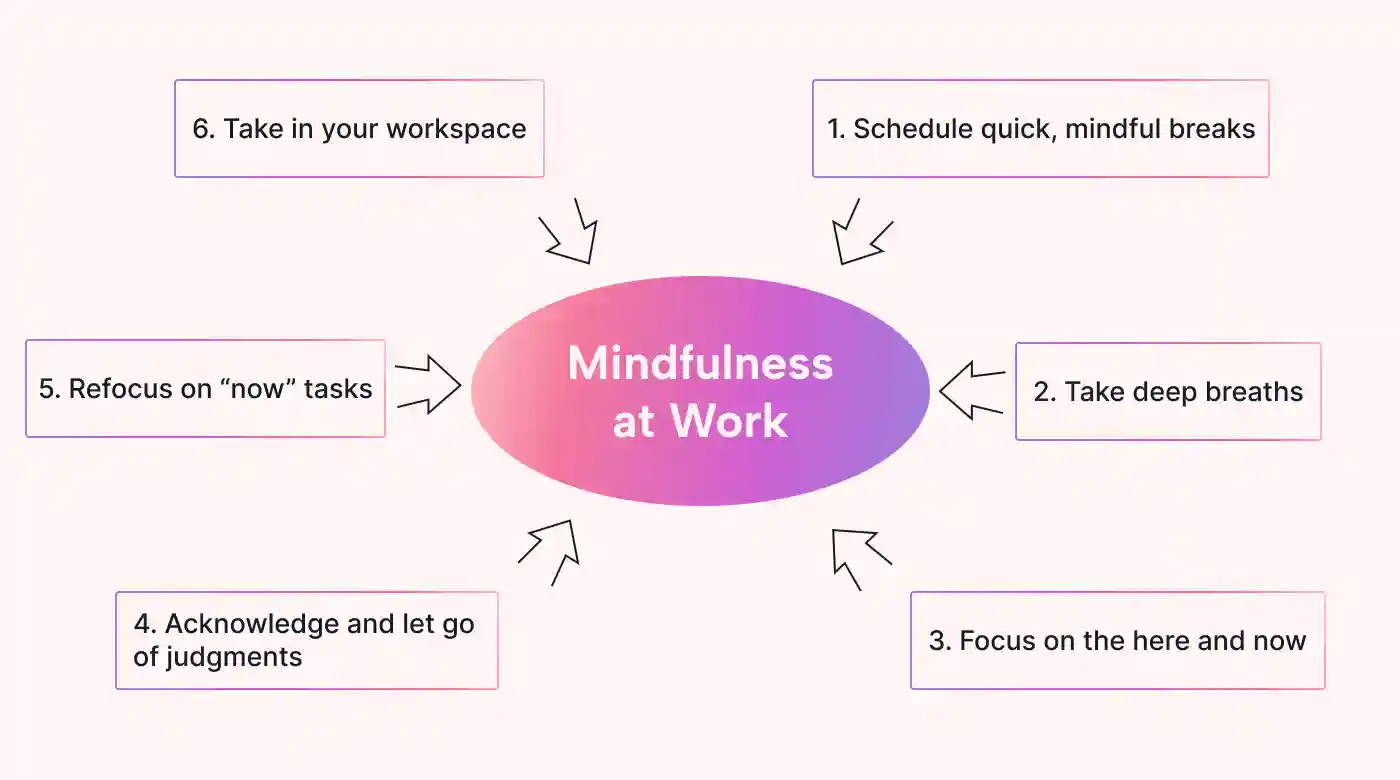 |
When employees practice mindfulness, they become better at understanding their own feelings and those of their coworkers. This helps them communicate and work together more effectively. With heightened awareness, thoughtful responses rather than reactive ones come through. As a result, you create a more harmonious and effective team and work environment.
Enhanced productivity and efficiency
The Zen principles of simplicity and prioritization streamline work processes. As you develop a more organized and focused approach to completing tasks, embracing a calm and centered mindset becomes second nature.
The more closely you align with these principles, the clearer your path toward your goals will become. Simplifying daily routines and focusing on what matters will significantly improve the quality and speed of your work.
5 common productivity challenges that Zen habits can help solve
We all struggle with staying productive at work from time to time. But how do you get out of the funk, especially when deadlines loom and distractions are everywhere? Implementing Zen principles can help.
Let’s take a look at five common challenges and how adopting Zen habits can change your approach to overcoming them.
1. Avoiding procrastination
It’s easy to put off tasks when you’re feeling overwhelmed by a never-ending to-do list or uncertain about where to start on a complex project. These stressors can lead to a cycle of delay, further increasing stress and feelings of dread.
Zen habits break the cycle of procrastination by fostering a mindset that focuses on the present action. For example, setting clear, manageable goals gives you a straightforward path to follow, and practicing mindfulness can help you recognize and set aside distracting thoughts during work.
2. Managing distractions
Researcher Clifford Nass famously said, “Multitaskers are suckers for irrelevancy; everything distracts them.”
There are constant notifications and stimulants in the workplace that demand your attention. If you can’t manage them, your attention becomes fragmented.
Single-tasking and creating a minimalist workspace are Zen practices that reduce interruptions and improve focus. By dedicating your full attention to one task at a time, you work more efficiently with improved work quality.
A workspace free from unnecessary clutter also supports a focused mindset since your physical environment promotes concentration rather than distraction.
3. Prioritizing with a busy schedule
Many of us are guilty of juggling multiple projects without clear priorities, which often results in us completing the low-value tasks first. This bad habit can leave important, high-impact tasks neglected.
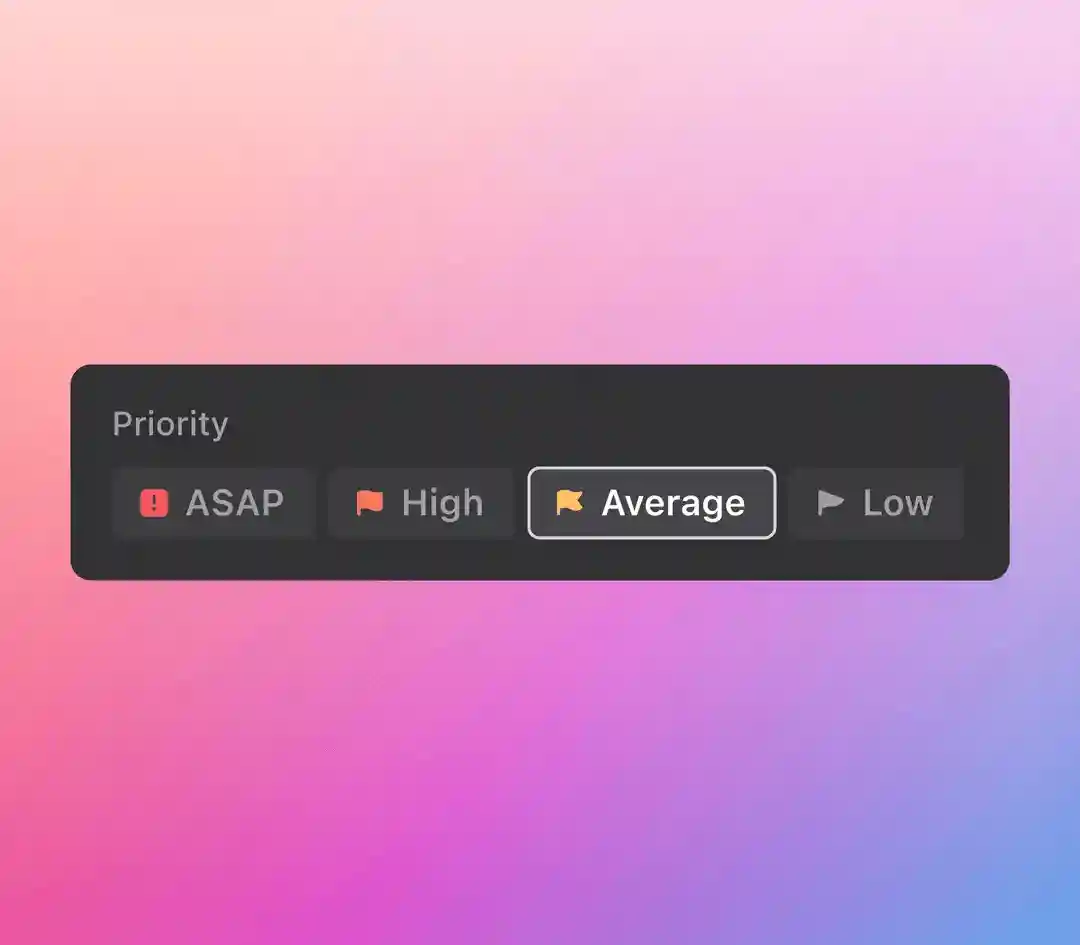 |
Zen principles encourage you to identify the essentials and eliminate the extras. Practices such as mindful reflection on the value and impact of each task aid in effective prioritization and time management. When you take a moment to reflect, you’re more likely to allocate your time and resources so that the most important tasks get the attention they need.
4. Maintaining consistent motivation
Staying motivated can be difficult, especially when it comes to monotonous or long-term projects. Over time, as the novelty of these tasks fades, the end goals can seem less compelling or too distant, causing your engagement and productivity to dip.
Aligning your tasks with your personal values can help sustain your motivation. It helps you find a connection between your daily work and broader life goals, making each task more meaningful. When your work resonates with your core values, it turns from being just a bunch of tasks you need to do into an important part of your personal growth.
5. Dealing with burnout and stress
Ironically, stressing too much about work can cause a reduction in productivity. High-pressure environments and continuous workloads often push employees toward the edge of burnout and chronic stress.
It’s estimated that 80% of workers feel stress on the job, and nearly half say they need help in learning how to manage this stress.
Zen practices like meditation, deep breathing, and mindful breaks can help you manage stress levels and prevent burnout by promoting relaxation and mental clarity. They offer a momentary pause from the demands of work and help reset the mind and body.
8 Zen habits for productivity
Here are eight essential Zen habits grouped into specific categories. Use them to build a custom Zen routine for more productivity:
Simplifying your workflow
Improve your efficiency by cutting out unnecessary steps and distractions.
1. Identify the essential
Focus on what truly matters in your tasks and projects. This practice will not only streamline your workload but also ensure that your efforts are directed toward high-impact activities.
A good way to identify what’s important is to list your tasks in order of priority and tackle them sequentially.
2. Reduce clutter
Simplify your physical and digital workspace to improve your focus. A clutter-free workspace can lead to a more organized mind and a smoother workflow.
You can start by organizing your desk and removing unimportant digital notifications and background apps.
Mindful engagement in tasks
Mindfulness helps you stay focused and fully engaged in your work.
3. Practice single-tasking
Employee multitasking causes organizations to be 27.5% less productive. So, prioritize one task at a time for increased efficiency.
Single-tasking ensures that you give your best effort and attention to each task, leading to higher-quality work and reduced stress.
4. Take mindful breaks
Build short, mindful breaks into your daily routine. These breaks are crucial for maintaining long-term productivity and avoiding burnout because they allow your mind to rest before the next task.
Breaks are also a great way to declutter your mental space. As a result, you get the opportunity to step back, clear your thoughts, and return to your tasks with a refreshed perspective and renewed energy.
Building sustainable habits
Habit formation doesn’t happen overnight — it’s about the long haul.
5. Make gradual changes
Small, incremental changes often lead to big results. They help ensure that your new habits are manageable and more likely to become a permanent part of your routine. You’ll also be less likely to feel overwhelmed by pressure or discouraged by unrealistic goals.
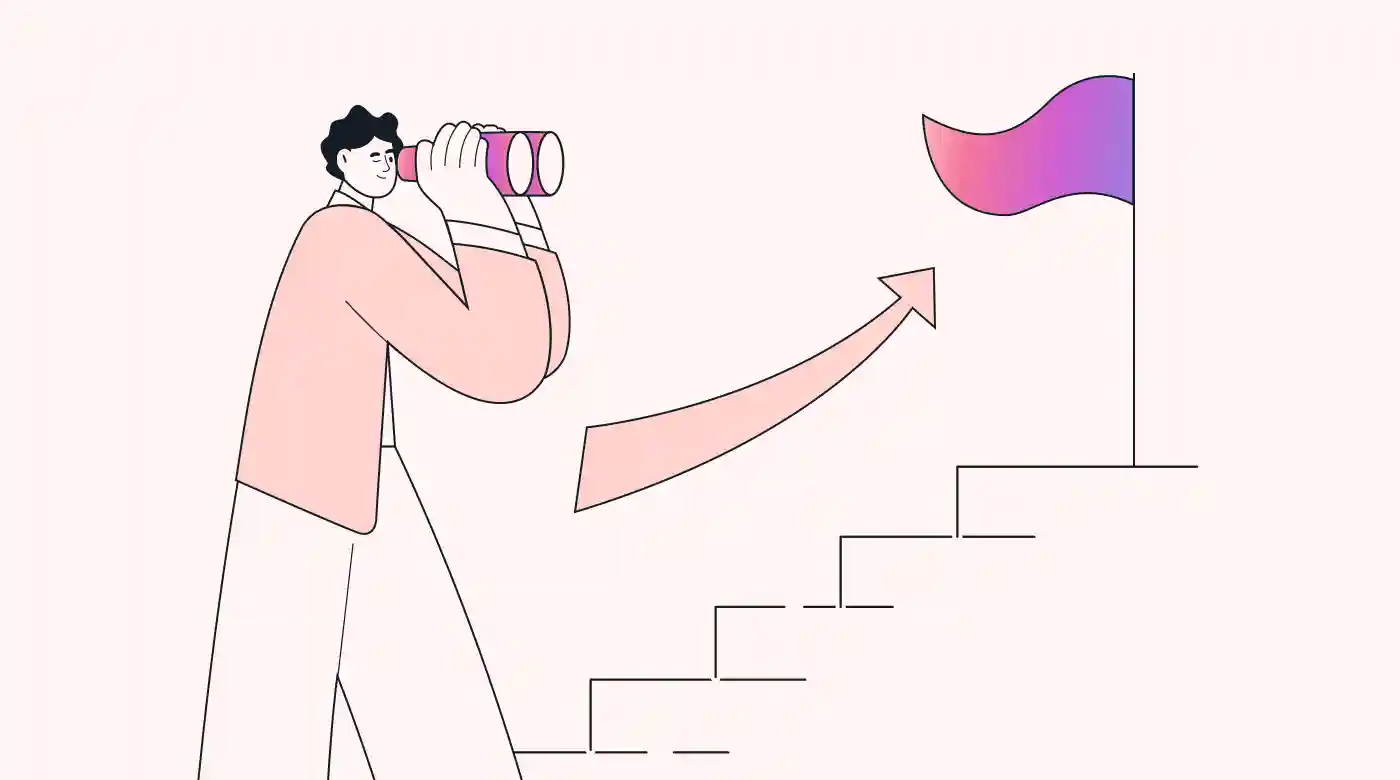 |
Let’s say your goal is to improve time management. Start by introducing a simple daily planning session and gradually incorporating more complex time-management techniques as this habit becomes automatic.
6. Build new habit triggers
Establish cues in your environment that prompt you to engage in productive behaviors. These triggers will act as constant reminders for you to carry out your new habits.
For example, setting a specific time for a short walk after completing a major task can be a trigger for refreshing your mind and boosting your energy level.
Improving team collaboration
Elevate teamwork with Zen-inspired collaborative habits.
7. Form collective habits
Encourage your team to develop habits that foster collaboration and productivity together. Having shared routines or rituals can enhance your team’s coherence and efficiency.
For instance, start each meeting with a brief mindfulness exercise to ensure everyone is present and focused.
8. Set shared goals
Align team objectives with Zen practices. Establishing common goals guided by Zen principles ensures that everyone is working toward a shared outcome. Setting a collective goal for a project and regularly revisiting it during team meetings can help the team maintain its focus and drive.
Motion helps you build and sustain Zen habits for productivity
Building and maintaining new habits is never easy. But with Motion’s intuitive tools and features, you can easily build these habits into a part of your daily routine, boosting your work productivity.
Automated scheduling
Motion’s automation and AI capabilities change how you plan the day — because they do it for you.
Motion efficiently organizes your schedule, fitting in meetings, tasks, and breaks. This automation removes the stress of manual planning, allowing you to concentrate on your current tasks with a clear mind.
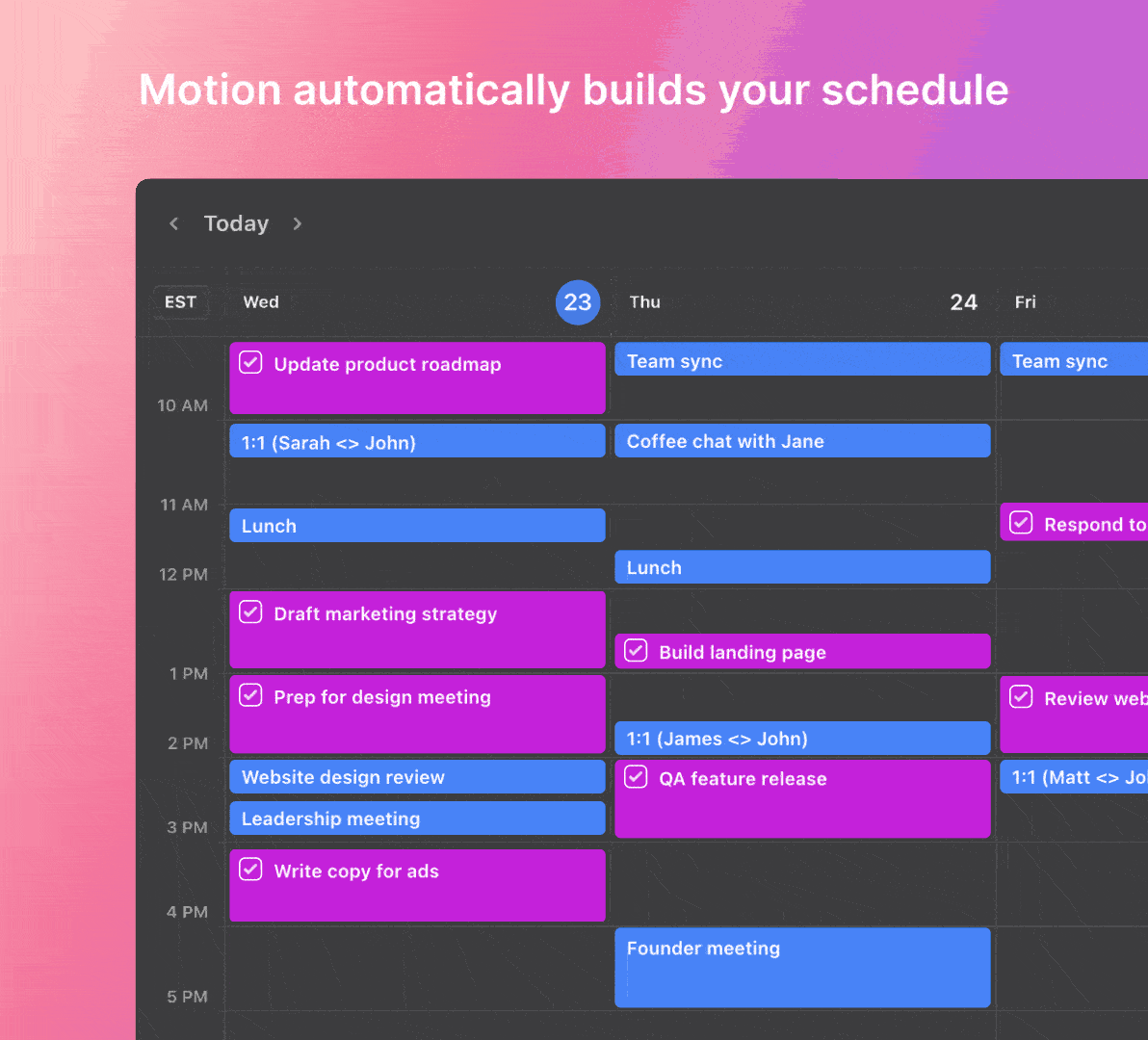 |
Not only can Motion help you save time, but it can also enhance your ability to work with intention and purpose, embodying the Zen principles of mindfulness and simplicity.
Deep work and time-blocking
Motion supports deep, uninterrupted work and time blocking, a core Zen practice for productivity. By allocating specific time slots for focused work, Motion helps you minimize distractions and maximize concentration. You can immerse yourself fully in each task and focus on completing your work to the best of your ability.
Streamlined team collaboration
Motion’s tools are expertly designed to assist you in managing team projects, sharing progress, and prioritizing work, thereby fostering a Zen-like environment of clarity and collaboration. Team members can see the status of their tasks, projects, and teammates in real time, ensuring everyone is on the same page.
This level of transparency and organization streamlines the team’s communication and decision-making abilities.
Teams can apply the Zen principles of harmony and focused effort to create a more cohesive and productive work environment.
The Happiness Algorithm
Motion’s unique “Happiness Algorithm” is ingeniously crafted to increase productivity while also maximizing user happiness and satisfaction, resonating with the Zen principles of balance and well-being. The algorithm prioritizes your most important work, making sure you tackle your essential tasks first.
Motion also pushes you to do the tough stuff and avoid letting anything slip through the cracks. By guiding you through work with this mindful methodology, Motion helps you build and sustain Zen habits that enhance both your productivity and overall well-being.
Experience the Zen of productivity with Motion
Start your journey toward a more focused, efficient, and balanced work life with Motion. Try Motion for free to transform how you work, one habit at a time.

Vicki Chen is a content writer and marketer using proven storytelling methods to create high-quality copy and content for SaaS companies. When she's not writing, she's spending time with Taco, her rescue dog.
